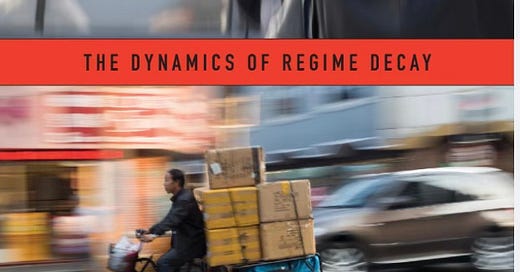Minxin Pei | China’s Crony Capitalism: The Dynamics of Regime Decay
China’s Crony Capitalism
The Dynamics of Regime Decay
Minxin Pei
ISBN 9780674737297
Publication date: 10/03/2016
Harvard University Press
When Deng Xiaoping launched China on the path to economic reform in the late 1970s, he vowed to build “socialism with Chinese characteristics.” More than three decades later, China’s efforts to modernize have yielded something very different from the working people’s paradise Deng envisioned: an incipient kleptocracy, characterized by endemic corruption, soaring income inequality, and growing social tensions. China’s Crony Capitalism traces the origins of China’s present-day troubles to the series of incomplete reforms from the post-Tiananmen era that decentralized the control of public property without clarifying its ownership.
Beginning in the 1990s, changes in the control and ownership rights of state-owned assets allowed well-connected government officials and businessmen to amass huge fortunes through the systematic looting of state-owned property—in particular land, natural resources, and assets in state-run enterprises. Mustering compelling evidence from over two hundred corruption cases involving government and law enforcement officials, private businessmen, and organized crime members, Minxin Pei shows how collusion among elites has spawned an illicit market for power inside the party-state, in which bribes and official appointments are surreptitiously but routinely traded. This system of crony capitalism has created a legacy of criminality and entrenched privilege that will make any movement toward democracy difficult and disorderly.
Rejecting conventional platitudes about the resilience of Chinese Communist Party rule, Pei gathers unambiguous evidence that beneath China’s facade of ever-expanding prosperity and power lies a Leninist state in an advanced stage of decay.
Praise
Pei makes a powerful and convincing assertion that China’s party-state is both predatory and decaying as he analyzes the nature of destructive collusive behavior. An important book by one of our leading analysts of Chinese politics.
—Joseph Fewsmith, author of China since Tiananmen
While many debate about how capitalist and market-driven China is, Pei shows in this sobering book that the real issue is the quality of Chinese capitalism. No one has detailed the evolution of corruption in China as ably and as comprehensively. An excellent work, whose timing could not be better.
—Yasheng Huang, author of Capitalism with Chinese Characteristics
Pei’s penetrating account of what he terms the ‘rapacious crony capitalism’ spawned by China’s economic rise is lucid, provocative, and deeply disturbing. This is a distinctive contribution to debates about the staying power of China’s political system and the limits of its model of economic development.
—Andrew G. Walder, author of China Under Mao
Pei’s book is quietly devastating. In sober, restrained language, he exposes the full gravity of corruption in China. Presenting a wealth of evidence, he shows that this is not the unfortunate by-product of rapid economic growth but the result of strategic choices by the party. With clinical precision, Mr Pei explains how corruption operates at every level, perverting each branch of the party-state and subverting the political authority of the regime…This book is essential reading for anyone who wishes to understand China today, or engage with it at any level, in any field.
—The Economist
This is an unparalleled and meticulous analysis of the deeply embedded and widespread corruption engulfing the world’s second-biggest economy… Pei has pulled apart the spiderwebs of Chinese corruption by scrutinizing the published accounts of more than 250 of those penalized for bribery. The details, down to their single or multiple mistresses, orgies and the involvement of their families, make the narrative and conclusions vivid and convincing… In his path-breaking analysis, Pei reveals the vast scale in post-Tiananmen China of ‘collusive corruption’… [An] overwhelmingly convincing and dispiriting book.
—Jonathan Mirsky, Times Higher Education
Xi Jinping claims to be eliminating corruption from China’s economic and political systems. Pei, one of the world’s most knowledgeable scholars, argues that this is impossible because corruption is the system. The liberalization of markets has combined with the absence of clear property rights to allow the well-connected to accumulate vast fortunes through looting state property.
—Martin Wolf, Financial Times
As Minxin Pei notes in a brilliant book, China’s Crony Capitalism, it is all too easy for a would-be strongman to use the charge of corruption as a cudgel against rivals. Yet it is so effective precisely because it is plausible. Using evidence published by the Chinese authorities, Pei shows that collusive corruption is pervasive. It distorts the economy,
degrades administration and robs the party of its social legitimacy.—Martin Wolf, Financial Times
Minxin Pei vividly demonstrates how corruption in China is not merely a governance challenge: it is a fact of life. Corruption permeates business, politics, and even personal relationships to a startling degree…It is a damning portrait, in which China resembles the United States during the Gilded Age, complete with robber barons, crime bosses, and dirty politicians—and with all the excesses intensified by authoritarian one-party rule…Pei’s bleak view is sobering, especially because his conclusions are based on careful analysis of a rich data set.
—Dali Yang, Foreign Affairs
Author
Minxin Pei is the author of several books on Chinese domestic politics, including China’s Crony Capitalism: The Dynamics of Regime Decay and China’s Trapped Transition: The Limits of Developmental Autocracy. He is the Tom and Margot Pritzker ’72 Professor of Government and George R. Roberts Fellow at Claremont McKenna College.




